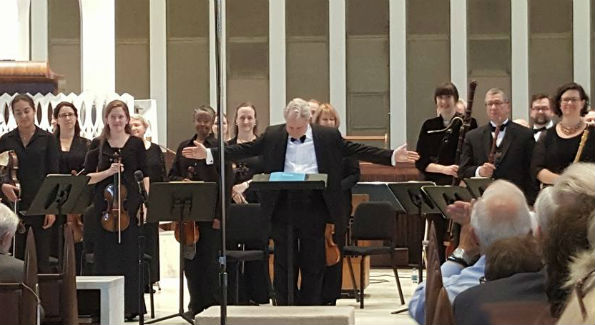The performance’s unexpected program changes sparked new excitement in the consort’s season opener.
By Patrick D. McCoy

Using the full compliment of resources at his disposal, Maestro J. Reilly Lewis lead an impressive season opener. (Photo by Patrick D. McCoy)
Washington Life has had the opportunity to be on hand for many of the season opening concerts of The Washington Bach Consort. But, this one was different in several ways. Though the concerts are generally recorded for archival purposes, founder and music director J. Reilly Lewis told his guests that not only were the recordings of the consort housed in the permanent collection at the Library of Congress, but stated that this concert in particular was being recorded for a long-awaited new recording by the consort. Most audiences are certainly familiar with Bach’s cornerstone choral work, the “Mass in B minor.” However, this afternoon concert perhaps was an introduction for some to his smaller masses and individual choral settings. The “Kyrie in F major, BWV 233a” began the program and created a moment of reverence. There was a radiant quality that seemed to shimmer within the voices of the sopranos and tenors, rounded out by the depth and warmth of the tenors and basses.
The “Mass in A major” followed next and presented an opportunity for the audience to hear even further variety in the music of Bach. There was also a bit of anxiety in this section of the program because Lewis had already announced that mezzo-soprano guest artist Sarah Davis Issaelkhoury was ill, which only allowed her replacement three hours to familiarize themselves with the work. It is any music director’s worst nightmare to find out close to a concert that your principal soloist is unable to perform, but as they say, “the show must go on” and it did. In the “Kyrie” there was a lovely sense of motion, with the sopranos almost floating seamlessly above the music. Joined by the altos of the choir, there was a delightful interplay as the women’s voices meandered around the other. Focused, rich singing was a constant throughout from the tenors and basses, forming the bedrock of a core ensemble sound.
There was a very high level of singing that came from the other principal soloists of the evening, particularly Kristen Dubenion-Smith, who shared a bit of the vocal weight in the alto section and solo work and bass Steven Combes singing with ease and conviction in the “Domine Deus, accompanied by Tatiana Chulochnikova playing solo violin. But the true transportive moment occurred when a consort veteran stepped up to sing the meatier demands of the afternoon that were up for grabs in the absence of the guest mezzo.
Barbara Hollinshead, who is one of the consort’s first members, was certainly more than a fill in. Taking her place beside the maestro, it was as if it was meant for her to be the soloist in that moment. In the “Quoniam tu solus sanctus,” Hollinshead championed the aria with such dexterity.
Her voice reached into the center of the vast sanctuary of the church and certainly was jubilant in nature.
Closing the work was an expansive setting of the “Cum Sancto Spiritu” with instruments and voices resounding into the vastness of the space.
Book ending the concert were the “Sanctus in D, BWV 238,” which was moving in the way each vocal section entered in succession, and the “Mass in G, BWV 234” featuring a variety of solos and combinations. The voices of the chorus were fresh and exciting in the “Kyrie” especially as the voices shifted back and forth on ‘Christe,’ a mechanism that brought even greater attention to the meaning of the text. Tenor Robert Petillo was in fine form in the “Quoniam” displaying such control and vocal warmth. It would be a transgression not to mention the wonderful playing that came from the instrumentalists.
Along with Petillo, the instruments of the period such as the threorbo, played by William Simms, had an opportunity to shine beyond mere accompaniment, but rather as a complete ensemble with the singer. Another such glowing moment came in the beautiful duet between soprano Katelyn Aungst and mezzo-soprano in the “Domine Deus.” As the two soloists blended well together, the lyrical cello of John Moran supported on the portative organ by Todd Fickley provided for the most perfect continuo.
The music was certainly the highlight of the concert, but the remaining thought was how a sense of collegiality seemed to blanket the musicians as they had to execute a program in a manner that was not planned. And what happened? The concert was a resounding success and the audience was excited to be pulled into the experience, even if it was at first an unforeseen circumstance.
After earning degrees in music from Virginia State University and Shenandoah University, Patrick D. McCoy has contributed arts pieces to CBS Washington and The Afro-American Newspaper, among others. He also writes the magazine’s monthly performing arts column “Perfect Pitch.” McCoy may be reached via email at wlperformingarts@aol.com and on Twitter @PatrickDMcCoy.




